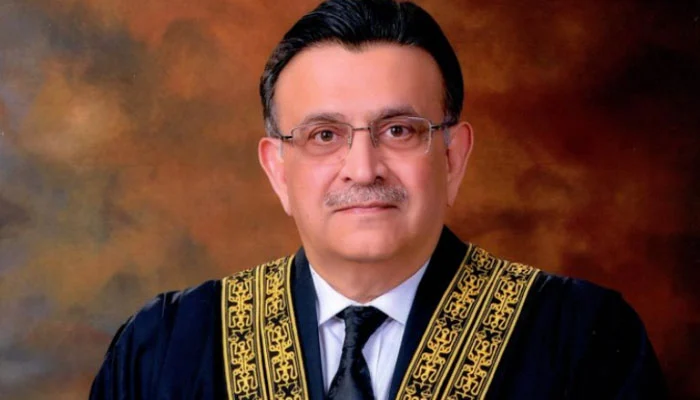ISLAMABAD, May 23 (ABC): Chief Justice of Pakistan Umar Ata Bandial on Monday was named among the top 100 most influential people of 2022, the list released by Times Magazine showed.
Aitzaz Ahsan, while penning down the profile of CJP Bandial for the list, noted that he is “widely respected for his integrity”.
The seasoned lawyer described CJP Bandial as a “polite and understated” judge.
Ahsan, an attorney and former leader of the house in the Senate, wrote: “The Columbia- and Cambridge-educated jurist bears the heavy mantle of not just delivering justice but also being seen to do so.”
“In early April, the Supreme Court of Pakistan, led by Bandial, overturned former prime minister Imran Khan’s move to dissolve Parliament, declaring it ‘unconstitutional’.”
The writer noted that CJP Bandial entered the scene when another crisis was impending with the world markets already wreaking havoc on the national economy and civil-military relations again under strain.
“How far he [CJP Bandial] succeeds in this task may well determine the trajectory of Pakistan, and its region, for years to come,” he concluded.
In his law practice at Lahore, CJP Bandial dealt mostly with commercial, banking, tax, and property matters. From 1993 until his elevation, he also handled international commercial disputes, according to the details on the Supreme Court’s website.
He appeared in arbitration matters before the Supreme Court and also before international arbitral tribunals in London and Paris. CJP Bandial was elevated as an LHC Judge on December 4, 2004.
He had declined oath under PCO [provisional constitutional order of Pervez Musharraf] in November 2007 but was restored as an LHC judge as a result of the lawyers’ movement for the revival of the judiciary and constitutional rule in the country.
Later, he served for two years as the LHC chief justice until his elevation as a judge of the Supreme Court in June 2014.
He was sworn in as the 28th Chief Justice of Pakistan in an oath-taking ceremony on February 2, 2022.
During his career as a judge of the LHC and the Supreme Court, he has rendered judgments on several important public law and private law issues.
These include pronouncements on civil and commercial disputes, constitutional rights, and public interest matters.
He received his elementary and secondary education at different schools in Kohat, Rawalpindi, Peshawar, and Lahore. He secured his BA (Economics) degree from Columbia University, USA followed by a Law Tripos degree from Cambridge University, UK, and qualified as Barrister-at-Law from Lincoln’s Inn, London.

